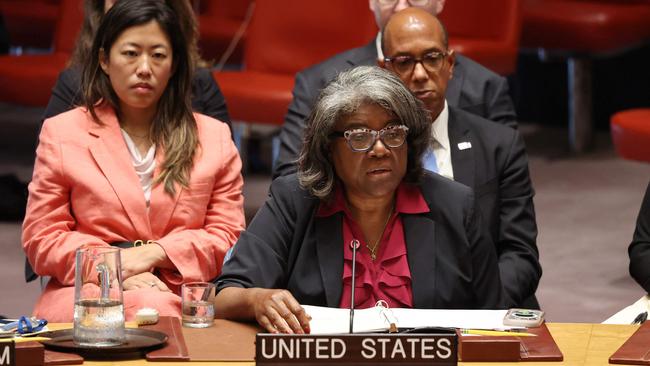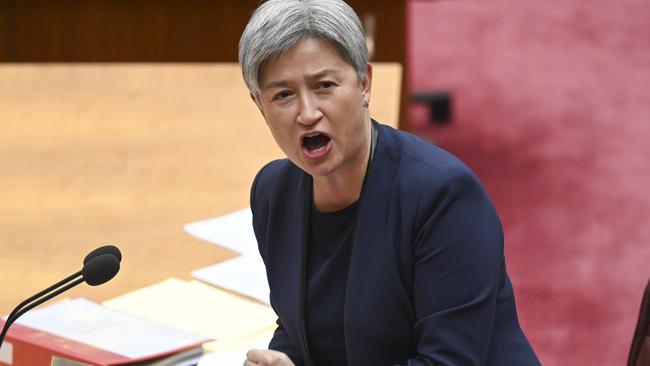US condemns ‘inflammatory’ Palestinian resolution as Australia negotiates on text
The US has lashed a draft UN resolution by the Palestinian Authority as ‘one-sided’ and ‘inflammatory’ as the Albanese government works behind the scenes to have the motion watered-down.

You can now listen to The Australian's articles. Give us your feedback.
The US has lashed a draft UN resolution by the Palestinian Authority as “one-sided” and “inflammatory” as the Albanese government works behind the scenes to have the motion watered-down.
US ambassador to the UN Linda Thomas-Greenfield said the proposed resolution demanding an Israeli withdrawal from Gaza and the West Bank and sanctions against the Jewish state “does nothing to end the current conflict”.
“Using inflammatory language in this text is not going to advance the cause of peace,” Ms Thomas-Greenfield told a special UN session.
She said the “one-sided resolution” took a selective interpretation of the International Court of Justice’s call in July for an end to Israel’s “unlawful presence” in the Occupied Palestinian Territories, undermining prospects for a two-state solution.
The US has urged its allies including Australia to oppose the proposed resolution, which makes no mention of Hamas or its October 7 terrorist attack on Israel, when it comes to a vote early on Thursday morning (AEST).
But the Albanese government – which has twice broken with the US in recent months on key UN votes affecting Israel – is instead working with like-minded countries to have the motion’s language softened to something it could agree with, amid pressure from its pro-Palestine left flank.
“We want as many countries as possible to agree a practical path to a two-state solution and self-determination for the Palestinian people,” Foreign Minister Penny Wong’s spokeswoman said.
“We want this resolution to give Israel and the international community a practical way to respond to ICJ’s advisory opinion. We’ve engaged constructively in the hope of achieving that.”

“The Albanese government would spare themselves much pain if they simply accepted the offer of bipartisan support for Australia to oppose it, as any previous Australian government would have done,” opposition foreign affairs spokesman Simon Birmingham said.
Jewish groups also warned the “fundamentally flawed” motion could not be improved, and urged the government to take a firm stand by rejecting it.
“The only principled response is for the Australian government to vote against it,” Zionist Federation of Australia president Jeremy Leibler said.
Australia/Israel and Jewish Affairs Council executive director Colin Rubenstein said the motion was “so wildly extreme” it was hard to see how it could be made consistent with longstanding Australian policy.
But the Greens urged the government to back the motion, saying it offered “a chance for Australia to be on the right side of history”.
“The Australian government must formally recognise at the United Nations the state of Israel’s prolonged and deliberate effort to undermine peace and self determination of the Palestinian people,” the party’s foreign affairs spokesman Jordan Steele-John said.
The draft resolution is the first by Palestine since it became a de facto UN member four months ago with the support of Australia and 142 other nations.
It demands Israel end its presence in the occupied territories within 12 months and make reparations to Palestinians, and calls for sanctions and travel bans on Israelis linked to the occupation.

“The Palestinians want to live — not survive. They want to be safe in their homes,” he told the special UN session.
“How many more Palestinians need to be killed before change finally takes place to stop this inhumanity?”
Israel’s UN Ambassador Danny Danon also rejected the resolution in a speech to the general assembly.
“We gather here to watch the Palestinians’ UN circus — a circus where evil is righteous, war is peace, murder is justified,” Mr Danon said.
“How dare you continue this tradition of passing one-sided resolutions against Israel.”
Ms Thomas-Greenfield said the motion ignored the reality that peace could only be achieved by negotiation between Israel and Hamas.
“It also fails to acknowledge, among other things, that Hamas, a terrorist organisation, is currently exerting power, control, and influence in Gaza.
“And it refuses to address the reality that Israel, a United Nations member state, simply has a right to protect and defend its people from acts of terror or violence.”




To join the conversation, please log in. Don't have an account? Register
Join the conversation, you are commenting as Logout